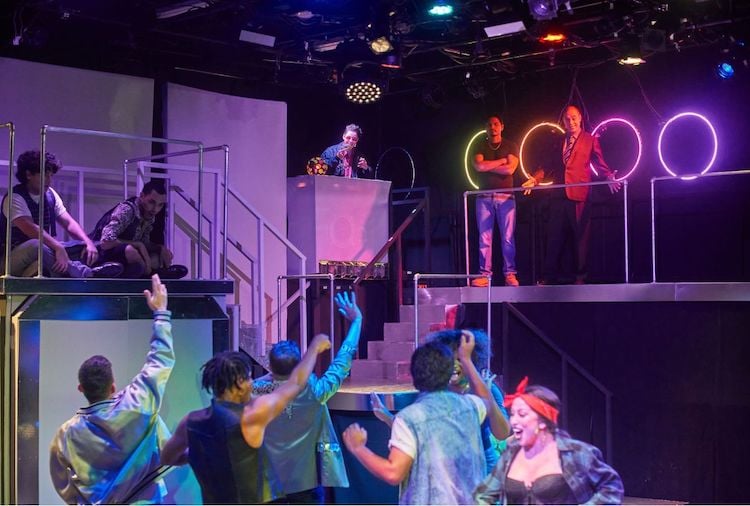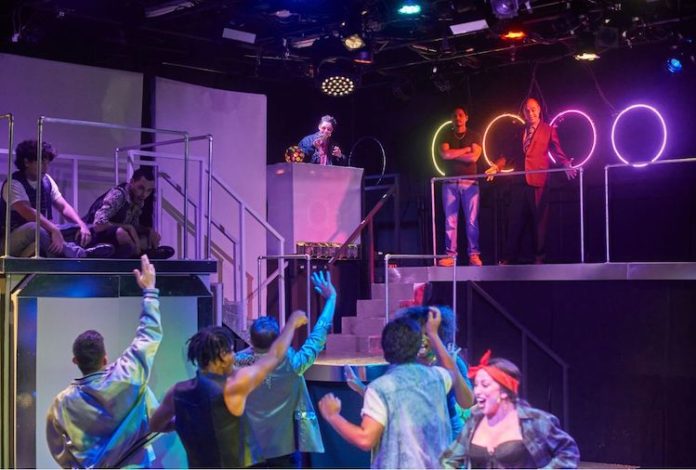
“Arena A House Musical” is based on the house music of the 1990s that was pumped at the legendary Arena nightclub in Hollywood.
The play is a coming-of-age story following Lucio Torrez, a young music minister at his father’s Apostolic church, and his friends during a turbulent decade when HIV/AIDS wiped out a generation of LGBTQ+ people of color.
Torrez’s father sends his son to conversion therapy camp, hoping his son will “pray the gay away,” but Torrez looks to live his truth, find his voice, and a place where he can be free.
Abel Alvarado, who created and wrote “Arena A House Musical,” said it’s a story about staying true to one’s self and finding a chosen family, according to a press release about the play.
“Arena: A House Musical is a love letter to our LGBTQ+ ancestors, the House music of the era and the iconic Arena nightclub: A place where our community was able to shine and thrive in their true authenticity,” he said.
Ex L.A. City Councilman Tom LaBonge helped demolish Circus Disco
Arena history
Arena was located on Santa Monica Boulevard, just east of La Palma Avenue. A former ice factory, the 22,000-square-foot structure opened as a nightclub in 1990.
It was owned by Gene La Pietra, who also was the proprietor of Circus Disco, a colossal club next door to Arena that opened in 1974.
La Pietra also owned the six-acre property where both clubs were located.
After Union Ice decided to close its Hollywood location in 1985, LaPietra and his then-partner Ed Lemos bought the huge freezer building on Santa Monica Boulevard.
At first, they wanted to use the additional parking for their club and planned to lease the towering rectangular freezer.
When nobody wanted to rent the structure, the Circus Disco owners decided to open another club.
The old building was completely refurbished, with a grand new entrance placed below a 50-foot-high glass atrium.
Inside, clubbers encountered a wall of video screens. To the left or the right was the gigantic wooden dance floor. A long ramp, on the left, gradually lead to the second floor.
Each level featured several full-service bars. The second floor had a spacious patio.
For a time, dinner was included with the price of admission, which ranged from less than $10 to more than $20. Dancers could rest and eat at tables lining the second floor, below a row of porthole windows. A glass-walled room featured R&B and hip hop beats.
Arena demolished
Circus Disco was the oldest, and longest-running LGBTQ+ Latino nightclub in Los Angeles. For 40 years, it was not only a place to socialize and have fun, but also a sanctuary for the Latino LGBTQ community to develop a sense of identity, community and social support.
Arena also was a safe space for LGBTQ+ Latinos.
But in 2014, La Pietra asked the Los Angeles City Council to change the zoning for his six-acre property from industrial to residential and commercial, complete with plans for a mega condo development.
The council unanimously approved the change, sealing the clubs’ fates. La Pietra sold the property for approximately $75 million, to a developer who would demolish both clubs and build more than 750 luxury condominiums.
Both clubs had their last dances Dec. 31, 2015. They closed Jan. 1, 2016.
“Arena A House Musical” will close July 17 at the CASA 0101 Theater. Tickets are $35 for general admission, $30 for students and seniors, and $25 for Boyle Heights residents with ID, and $75 for VIP.
The play includes adult themes and nudity and is recommended for people 17 and older.
Related posts:








